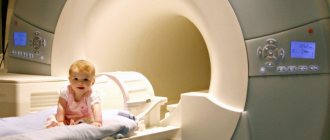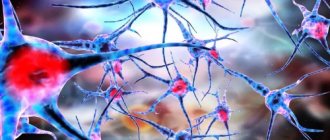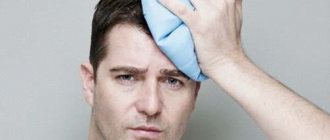A headache is, according to neurologists, any feeling of discomfort that is localized in the head area. Headache and nausea are two symptoms that often occur in patients who have suffered a traumatic brain injury, acute cerebrovascular accident, or those suffering from various diseases of the central nervous system.
Neurologists, oncologists, hematologists, and doctors of other specialties at the Yusupov Hospital make a collegial decision regarding patient management tactics. Complex cases of headache and nausea are discussed at an expert council meeting. Professors and associate professors, candidates and doctors of medical sciences take part in its work. Patients of the neurology clinic have the opportunity to undergo complex diagnostic procedures and neurosurgical interventions in partner clinics of the Yusupov Hospital located in Moscow.
Causes and characteristics of different types of headaches
Headache, nausea, weakness can occur under the influence of stress.
Headache, which is a consequence of anxiety, depression of various types, developing under the influence of everyday and work troubles, is quite common among patients at the Yusupov Hospital. It develops due to excessive tension in the muscles attached to the skull. This disease affects people of all ages, but especially from 25 to 60 years old. Typically, the intensity of the disease remains at the same level and does not increase with physical activity. Pain sensations are concentrated in the temporal, occipital or frontal areas. The pain is either compressive in nature; patients report that their head feels like they are being pulled in by a helmet.
Often headaches and nausea in both men and women occur in the presence of pathology of the central nervous system. This condition can occur due to traumatic brain injury when patients experience increased intracranial pressure. As a result of liquor hypertension, headache, nausea, and vomiting occur, which does not bring relief.
Headache and nausea may be a sign of meningitis. This is an infectious disease in which inflammation of the membranes of the spinal cord develops. In patients with meningitis, body temperature rises to high levels. They experience severe pain when trying to bring their head to their chest or straighten their knees. Infectious disease specialists and neurologists at the Yusupov Hospital carry out a comprehensive examination and adequate treatment of meningitis with the latest antibacterial drugs.
During a hypertensive crisis, women and men complain of headache, mainly in the occipital region, nausea, and dizziness. They vomit, which does not bring relief. During a hypertensive crisis, cardiologists at the Yusupov Hospital prescribe antihypertensive drugs to patients, drugs that improve brain nutrition and heart function. Stabilizing blood pressure helps prevent acute cerebrovascular accident - stroke.
Regardless of the patient's gender, nausea, vomiting and headache can be signs of food poisoning, a side effect of certain medications, anorexia and diabetes.
One of the most common causes of headaches and nausea is cerebrovascular disease. Headache associated with increased intracranial pressure may be an early sign of a brain tumor. It intensifies with sneezing, coughing, tilting the head, and is often accompanied by vomiting without previous nausea and transient visual impairment.
Headache, nausea, and dizziness often bother patients with cervical osteochondrosis, protrusion of intervertebral discs, and spinal hernias. The pain is usually localized in the cervical-occipital region. It often spreads to the temporal and frontal areas of the head, shoulder and upper limb. The headache intensity is moderate. The pain intensifies with prolonged stay in an uncomfortable position, sudden movement of the head, or pressure on the cervical-occipital muscles. Mobility of the cervical spine is limited.
After a traumatic brain injury, headaches may persist for several months. It is diffuse, dull, intensifies with physical activity and is accompanied by the following symptoms:
- Memory impairment;
- Decreased attention;
- Impaired sleep quality;
- Emotional disorders (low mood, tearfulness);
- Increased fatigue;
- Dizziness.
Doctors at the Yusupov Hospital identify the cause of headaches and dizziness using modern laboratory and instrumental research methods.
After analyzing the research results, complex therapy is carried out with the latest drugs, which are effective and have a minimal range of side effects. Make an appointment
What causes headaches
The central nervous system is designed in such a way that it perceives pain signals from all parts of the body, including certain areas of the head. Along the nerve endings, information about the problem that has arisen passes to the deep parts of the brain, causing irritation in the receptors, and then pain. Such signals can come from the periosteum, nasal sinuses, subcutaneous tissue layers, mucous membranes, eyes, large nerve canals, vascular network, and muscular apparatus. Some areas are completely insensitive to external stimuli due to the lack of receptors, therefore they are not capable of causing pain: bones, the neural network of the brain, vascular plexuses.
Headache in women
Migraines are often the cause of severe headaches and nausea.
Patients experience periodically recurring attacks of intense, pulsating headaches that last up to three days. Usually, unpleasant sensations appear in one half of the head, mainly in the forehead, eyes or one of the temples. Migraine headaches are aggravated by physical activity. It may be accompanied by nausea, vomiting, drowsiness and lethargy. Patients cannot tolerate bright lights and loud sounds. Young women are most often affected by migraines. This is facilitated by the rich hormonal background of the body, characteristic of the age of 25-30 years. An attack is the result of an increase in functional activity in specific centers of the brain.
In women, headaches and nausea occur more often for the following reasons:
- Severe fatigue or stress;
- Anemia (anemia);
- Hormonal changes;
- Brain tumors;
- Meningitis;
- Encephalitis.
Treatment
As first aid, it is necessary to exclude all possible external irritants, including unpleasant odors, loud sounds, and bright lights.
Take your usual painkiller, lie down and massage your head. You need to try to relax, before that open the window to freshen the air, drink a cup of weak tea. You cannot prescribe medications for yourself; this can only be done by a specialist. After consultation with him, a specialized examination and diagnosis, further treatment is planned.
The doctor can prescribe analgesics and adsorbents only for frequently recurring or unbearable attacks. The basis of therapy is the fight against the root cause; special drugs are prescribed, depending on the source of the disease. In particularly difficult cases, the issue of surgical intervention is decided. During the rehabilitation period, medications are also continued and physiotherapy is prescribed: massages, magnetic effects, gymnastics, cool compresses.
Headache in men
Short-term pain that occurs during physical effort in men is not a sign of disease.
This category also includes headaches that occur in men during sexual intercourse and last for several minutes. If an intense headache occurs during orgasm and persists for several hours, you should consult a doctor. If headaches and nausea are regular, neurologists at the Yusupov Hospital conduct an examination using modern neuroimaging methods. They make it possible to detect a brain tumor at the initial stage of development. For timely treatment of a dangerous disease, doctors recommend that patients who are worried about nausea, dizziness, or headache in the morning immediately contact a neurology clinic.
Description of attacks
When a patient wants to understand the cause of a pathological condition and consults a doctor, he must describe his feelings in as much detail as possible. Soreness with nausea is not an independent disease, but only a common symptom of a huge number of diseases that need to be distinguished from each other.
When a patient describes his feelings, he should talk about the following nuances:
- How often do attacks occur?
- The predominant time of day for the onset of discomfort.
- Approximate location of the lesion, intensity.
- What provokes it?
- Feelings after a long rest/sleep.
- Does vomiting provide relief from nausea?
- Are there other symptoms?
You need to prepare such a story for the doctor in advance so as not to forget the details during the consultation. This will help the specialist understand the situation as efficiently as possible.
Diagnostics
Neurologists at the Yusupov Hospital determine the cause of headaches and nausea using the following modern research methods:
- Electroencephalography;
- Echoencephalography;
- Rheoencephalography;
- Doppler ultrasound of head and neck vessels;
- Magnetic resonance and computed tomography of the brain;
- X-rays of the skull;
- Fundus examinations.
Patients receive consultation from related specialists (vertebrologist, otolaryngologist, oncologist, cardiologist, ophthalmologist).
Treatment tactics
The treatment regimen depends on the cause of the headache, the patient’s age, the presence of concomitant pathologies and other factors. Doctors have various techniques in their arsenal that can influence the cause of the disease and its clinical manifestations:
- drug treatment - may include a course of antibiotics, painkillers and anti-inflammatory drugs, drugs to improve blood circulation in the brain;
- surgical removal of tumors, cysts, aneurysms;
- additional techniques for eliminating headaches due to migraines and chronic fatigue: physiotherapy, massage;
- rehabilitation programs after stroke aimed at restoring speech, memory, and motor activity.
The Clinical Brain Institute offers comprehensive examination and treatment for patients complaining of headaches, nausea and vomiting. It is important to understand that treatment at home is ineffective. Independent attempts to eliminate these symptoms can lead to a deterioration in health and the development of complications. Doctors recommend seeking medical help at the first manifestation of illness.
Clinical Brain Institute Rating: 4/5 — 6 votes
Share article on social networks
Pharmacological therapy
Doctors at the Yusupov Hospital take an individual approach to relieving headache attacks with nausea in each patient. For migraines, the following medications are prescribed:
- Antidepressants (lerivone, amitriptyline);
- Beta-blockers (anaprilin, propranolol, obzidan);
- Calcium channel blockers (nimodipine);
- Non-steroidal anti-inflammatory drugs (indomethacin, piroxicam, naprosyn);
- Serotonin antagonists (pizotifen, cyproheptadine);
- Anticonvulsants (apilepsin, carbamazepine);
- Muscle relaxants (mydocalm, sirdalud).
Complex medications taken during an aura help prevent a migraine attack. If the cause of headaches and dizziness in women is menstruation, doctors prescribe non-steroidal anti-inflammatory drugs. You can prevent a migraine attack by following the following recommendations from doctors:
- Limit the consumption of foods that contain tyramine (red wine, dark chocolate, nuts, cheese, citrus fruits);
- Perform therapeutic exercises with an emphasis on the cervical spine;
- Massage the collar area;
- Take a course of acupuncture.
Professors, doctors of medical sciences, who work at the neurology clinic of the Yusupov Hospital, use their own methods of psychotherapy and biofeedback to treat headaches and nausea. Neurologists prescribe the following medications to patients:
- Non-narcotic and narcotic analgesics;
- Ergot alkaloid derivatives;
- Triptans;
- Antiepileptic drugs;
- Antihypertensive drugs;
- Botulinum toxin preparations.
All medications that neurologists use for headaches and nausea are divided into two groups: drugs for relieving headache attacks and prophylactic agents.
The first group of pharmacological drugs includes non-narcotic analgesics and non-steroidal anti-inflammatory drugs (ketonal, naproxen, paracetamol, ibuprofen). Patients suffering from diseases of the gastrointestinal tract are advised by a gastroenterologist before starting therapy with these drugs. To prevent complications, doctors prescribe proton pump inhibitors. Preventive therapy is carried out for those patients who often experience severe attacks of headaches. In most cases, medications are prescribed in courses lasting from several months to several years. To prevent headaches and nausea, neurologists prescribe beta blockers, antiepileptic drugs, calcium channel blockers, and antidepressants to patients.
Some patients are given monotherapy (treatment with one drug), while in other cases combination therapy is preferred. Each drug is initially prescribed at the minimum effective dose, and then, if indicated, the dose is increased. This allows you to reduce the severity of side effects of the therapy.
Make an appointment
Secondary headache and diseases in which it occurs
In general, primary headache, although it disrupts the normal course of life during attacks, does not have serious consequences for a person’s general health. And secondary pain, despite the fact that it occurs much less frequently (in 5% of cases), can be a consequence of a dangerous disease.
Headache is necessarily present among the symptoms of the following diseases:
- vegetative-vascular dystonia (headaches can be combined with dizziness, nausea, fluctuations in blood pressure);
- hypertension (pain is mainly localized in the occipital region, there may be dizziness, noise in the head, spots before the eyes, heat in the head, pain in the heart);
- stroke;
- traumatic brain injury;
- meningitis;
- encephalitis;
- eye diseases (for example, glaucoma);
- diseases of the ear and nasopharynx (otitis media, sinusitis);
- neuralgia;
- diabetes;
- renal failure;
- oncological diseases.
Prevention
What to do if you have a severe headache and nausea? A few tips can help reduce the frequency of migraine attacks:
- you should reduce the consumption of foods and drinks that provoke attacks;
- avoid long breaks in meals;
- sleep at least 8 hours a day;
- avoid stressful loads;
- quit smoking;
- increase physical activity, especially swimming;
- spend more time in the fresh air;
- avoid long trips by car, bus, boat;
- Do not stay in a room with strong unpleasant odors.
What to do?
Contact the Quantum Satis clinic. Here you can get advice from an experienced neurologist. Migraines aren't the kind of headaches you can just endure at home, and here's why:
- You need to make sure that it is a migraine and not a severe, life-threatening neurological disease. After all, many pathologies have similar symptoms.
- Attacks are constantly repeated, which reduces the quality of life and leads to loss of ability to work.
- Untreated or improperly treated migraine leads to severe complications, including migraine cerebral infarction.
There are effective treatments for migraines. Timely prescribed therapy will help to endure the attack much easier or stop it completely. If necessary, supportive treatment is used to reduce the frequency of migraine attacks, shorten them and reduce the severity of symptoms.
Non-drug therapy
Frequent headaches occur when the neck muscles are tense.
The initiator of the cascade of events that ultimately lead to physical or biochemical changes that provoke headaches is the “sticking together” of soft tissues (muscle, connective tissue, tendons and ligaments) and pinching of peripheral nerves. In this case, rehabilitation specialists at the Yusupov Hospital carry out therapy aimed at removing mechanical restrictions in the entire kinetic chain of the body: in the jaw, neck, and shoulder girdle. When a nerve is pinched, in addition to the tension headache itself, the following symptoms occur:
- Nausea,
- Numbness;
- Tingling;
- Burning;
- Increased sensitivity.
Doctors at the Yusupov Hospital Neurology Clinic have extensive clinical experience in treating headaches and nausea.
They reduce the severity of these symptoms or neutralize them through a combination of drug treatment methods with a properly selected set of gymnastic exercises. Specialists at the rehabilitation clinic perform acupuncture, various types of massage, and physiotherapeutic procedures for headaches and nausea. Rehabilitators are fluent in various types of massage, osteopathic and soft manual techniques, and kinesiotaping. They use innovative methods of non-drug therapy for headaches and nausea:
- Biofeedback;
- Kinesiotherapy;
- Laser therapy.
In order to undergo an effective course of treatment for headaches and nausea, make an appointment with a neurologist at the Yusupov Hospital online or by calling the call center at any time of the day.
Make an appointment
Diagnostic features
Laboratory tests and physical examinations can be done at any local clinic, but CT scans require special equipment. Not all clinics have it. To find your nearest imaging centers, please visit our appointment portal. Here we collect data on all diagnostic centers, divided according to various parameters: ratings, reviews, prices, characteristics of tomographs, discounts, etc. Select the studies you need, call the site operators for consultation, sign up for any type of scanning under special conditions from the service.
Contraindications to the use of headache medications
Each drug intended for pain relief has a number of indications and contraindications. If you have the latter, it is recommended to consult your doctor before taking the pills.
Main contraindications to the use of painkillers:
- individual intolerance to the components of the drug;
- period of pregnancy and breastfeeding;
- cardiovascular diseases;
- blood clotting disorder;
- bronchial asthma and other pathologies of the respiratory system;
- ulcerative lesions and erosions of the gastrointestinal tract;
- hepatitis and liver failure;
- allergic diseases, etc.
To minimize the risk of complications, it is necessary to entrust the selection of headache remedies to a qualified doctor. Only a specialist will be able to take into account the compatibility of various drugs in complex therapy and select the required dosage.









